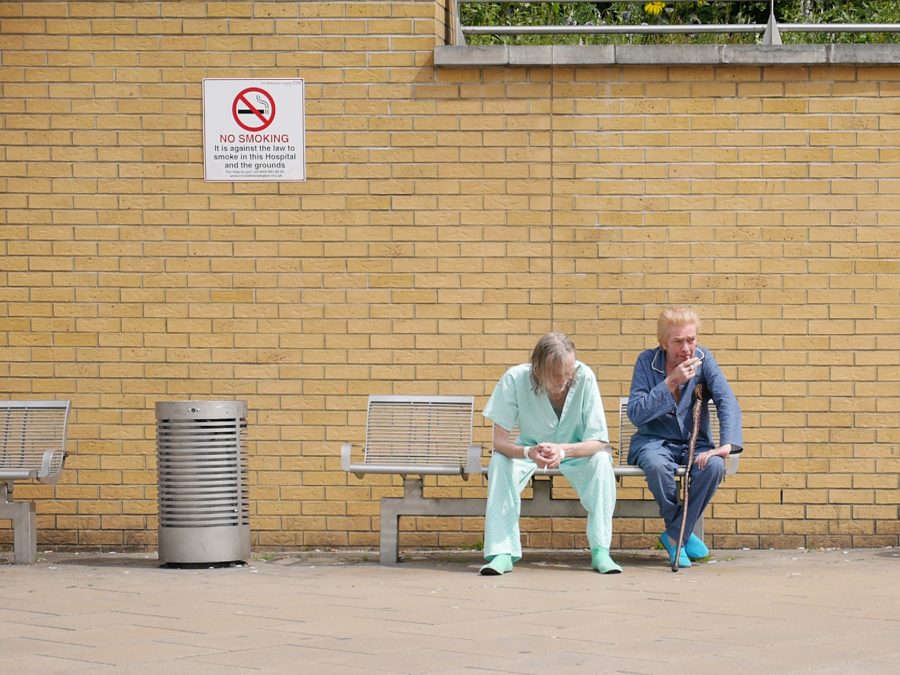I have spent a quarter of a century caring for people dying from smoking. Deaths of this sort are not only premature but often horrible. My mother’s death from lung cancer was both. The puritan nature of my medical heart should, therefore, leap up at the new restrictions of the Tobacco and Vapes Bill, introduced to parliament today. Smoking, Labour have declared, should be banned outside schools and hospitals. How they intend to police the ban, they haven’t said.
Self-righteous pleasure at seeing other people’s freedoms being reduced – unhealthy freedoms one disapproves of – should come naturally to a practising doctor. Instead, I’m struggling to feel even a frisson of morally superior joy. Something is amiss. The problem is not that I lack the instinct to take pleasure in the diminishment of other people’s enjoyments. The problem is the Bill.
Taxes and restrictions and making smokers feel like lepers has saved lives
This isn’t the first time restrictions on smoking in hospitals have been brought in. Decades ago, hospitals started corralling smokers into shelters, with some success. Bureaucracy never sleeps, however, and from 2018 the NHS Smokefree Pledge introduced a zero-tolerance policy to smoking which banished the shelters. With nowhere to smoke in sprawling hospital grounds, the predictable result occurred – people went back to smoking everywhere. Hospitals and the Department of Health were able to congratulate each other on time and money well spent while in reality their decisions were as helpful as a split fingernail.
Has there ever really been a zero tolerance policy that meant what it said and actually worked? That the Tobacco and Vapes Bill could prevent smoking around hospitals and schools is a dishonest illusion. Smoking on NHS property is already banned to the highest degree. No hospital is without its sign saying that smoking is not allowed. But beneath every sign stands a smoker. No one enforces these no-smoking rules, and it is perfectly obvious that nobody should. Staff, their smoking shelters taken away, make mild efforts to be furtive. Visitors don’t bother, and to see them puffing away in front of these signs tells you what weight hospitals put on their own rules.
Then there are the patients, often lacking the physical ability to leave the grounds. Some want to quit smoking but can’t, others freely choose to continue. Still more have no sane reason to quit at all. Many are dying already, and smoking gives them pleasure and comfort. This NHS policy, with its failure to provide anywhere for patients to smoke, with its pretence that putting up a sign means the issue is solved, with its utter indifference to enforcing its own rules, is simply hypocritical virtue-signalling, laced with dishonest cruelty.
Today’s Bill offers more of the same. Restrictions on vape sales are welcome but the government has backed off banning smoking in the gardens of pubs and restaurants. If your motivation was to attack smoking rates effectively, that would be the step to take. Enforcement there is feasible, just as it was when smoking was banned indoors in pubs and restaurants. Licences to operate were on the line and action was taken.
Doctors will always want fewer people to smoke. Smoking deaths peaked early in Britain’s modern history: in the early 1960s, more than half of Brits smoked. Today that figure is 13 per cent and falling. We were quick to take up the habit of industrially produced cigarettes and became world leaders in giving it up.
Sir Richard Doll’s 19050s study of smoking in British doctors established that smokers had a one in two chance of dying from their habit, and lost a decade of healthy life along the way. More influentially, it demonstrated that this fact was even true amongst the doctors themselves. Studying the disease hit home in the medical profession. Doctors began to quit smoking and they campaigned for others to do the same; their campaigns were more effective because they’d put their willpower where their mouths were.
The magnitude of harm from smoking is hard to overstate. A lifelong habit does enough harm to cancel out all the rises in life expectancy for an individual since World War Two. It makes sense to want to ban it: eliminating smoking would have the same impact on the health system as would be gained by preventing every single form of cancer. These assertions are based on the highest quality evidence and they matter hugely: these are facts, not factoids.
Public health campaigns against smoking have certainly been intrusive but they have also been effective. Taxes and restrictions and making smokers feel like lepers has saved lives. But can the intrusion on freedom planned by Labour through today’s Tobacco and Vapes Bill be justified in the same way? To make up rules that will never be followed is an intrusion that’s no help whatsoever.
All of us dream of being better versions of ourselves. Maybe our hospitals and schools dream of being free of smoke. Legislation can also be usefully seeded with dreams, but – like life – it should never be based on fantasy. Smoking matters to those who enjoy it and to those who wish to reduce its costs to human health. This Bill looks set to trivialise both.







Comments